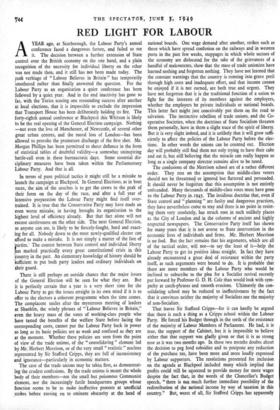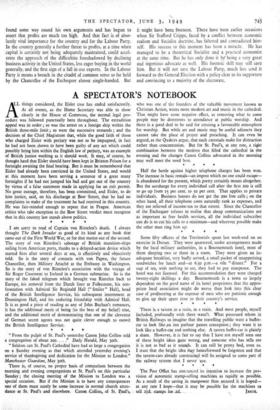RED LIGHT FOR LABOUR
AYEAR ago, at Scarborough, the Labour Party's annual conference faced a dangerous future, and failed to see it. The decision between a further extension of State control over the British economy on the one hand, and a plain recognition of the necessity for individual liberty on the other was not made then, and it still has not been made today. The rank verbiage of "Labour Believes in Britain" has temporarily smothered rather than finally answered the question. For the Labour Party as an organisation a quiet conference has been followed by a quiet year. And in the end inactivity has gone so far, with the Tories scoring one resounding success after another at local elections, that it is impossible to exclude the impression that Transport House has been deliberately holding its fire. The forty-eighth annual conference at Blackpool this Whitsun is likely to be the real opening of the General Election campaign. Nothing —not even the loss of Manchester, of Newcastle, of several other great urban centres, and the moral loss of London—has been allowed to provoke the premature discharge of the first shot. Mr. Morgan Phillips has been permitted to shout defiance in the form of statistical tables of doubtful validity—a somewhat uninspiring battle-call even in these bureaucratic days. Some essential dis- ciplinary measures have been taken within the Parliamentary Labour Party. And that is all.
In terms of pure political tactics it might still be a mistake to launch the campaign at Blackpool. In General Elections, as in boat races, the aim of the coaches is to get the crews to the peak of their form on the day of the race, and after a full year of intensive preparation the Labour Party might find itself over- trained. It is true that the Conservative Party may have made an even worse mistake, in having brought its organisation to the highest level of efficiency already. But that fact alone will not excuse carelessness on the other side. The next General Election, as anyone can see, is likely to be fiercely-fought, hard and exact- ing for all. Nobody down to the most newly-qualified elector can afford to make a mistake. It is not simply a matter of the fate of Parties.' The contest between State control and individual liberty has marked practically every great constitutional crisis in this 'country in the past. An elementary knowledge of history should be sufficient to put both party leaders and ordinary individuals on their guard.
There is still perhaps an outside chance that the major issues of the General Election will be seen for what they are. But it is perfectly certain that a year is a very short time for the Labour Party to get the issues straight in its own mind if it is to offer to the electors a coherent programme when the time comes. The complacent smiles after the mysterious meeting of leaders at Shanklin, the windy phrases of "Labour Believes in Britain," even the heavy mass of the votes of working-class people who have tasted the benefits of the welfare State before facing the corresponding costs, cannot put the Labour Party back in power so lag as its basic policies are as weak and confused as they are at the moment. Whether these policies are seen from the point of view of the trade unions, of the " consolidating " element led by Mr. Herbert Morrison, or of the very small " realistic " nucleus represented by Sir Stafford Cripps, they are full of inconsistency and ignorance—particularly in economic matters.
The case of the trade unions may be taken first, as demonstrat- ing the crudest confusions. By the trade unions is meant the whole body of their members—not the small but poisonous Communist element, nor the increasingly futile headquarters groups whose function seems to be to make ineffective protests at unofficial strikes before nassing on to eminent obscurity at the head of national boards. One wage demand after another, strikes such as those which have spread confusion on the railways and in western ports in the past few weeks, stoppages in which whole sectors of the economy are dislocated for the sake of the grievances of a handful of malcontents, show that the mass of trade unionists have learned nothing and forgotten nothing. They have not learned that the constant warnings that the country is running into grave peril through high costs and inadequate effort, and that income cannot be enjoyed if it is not earned, are both true and urgent. They have not forgotten that it is the traditional function of a union to fight for the interests of its members against the employers, whether the employers be private individuals or national boards. This latter fact might just conceivably put them on the road to salvation. The instinctive rebellion of trade unions, and the Co- operative Societies, when the doctrines of State Socialism threaten them personally, have in them a slight trace of the spirit of liberty.
But it is very slight indeed, and it is unlikely that it will grow suffi- ciently to affect the policies of the Labour Party before the elec- tions. In other words the unions can be counted out. Election day will probably still find them not only trying to have their cake and eat it, but still believing that the miracle can really happen so long as a single company director remains alive to be taxed.
The confusions of the Morrison school are of a rather different order. They rest on the assumption that middle-class voters should not be threatened or ignored but flattered and persuaded.
It should never be forgotten that this assumption is not entirely unfounded. Many theusands of middle-class votes must have gone to the Labour Party. in.1945. The insidious doctrine that, even if State control and " planning " are faulty and dangerous practices, they have nevertheless come to stay and there is no point in resist- ing them very resolutely, has struck root in such unlikely places as the City of London and in the columns of ancient and highly respected newspapers. The Conservative Party itself has shown for many years that it is not averse to State intervention in the economic lives of individuals and firms. Mr. Herbert Morrison is no fool. But the fact remains that his arguments, which are all of the tactical order, will not—to say the least of it—help the Labour Party to get its positive ideas straight. In fact they have already encountered a great deal of resistance within the party itself, as such arguments were bound to do. It is probable that there are more members of the Labour Party who would be inclined to subscribe to the plea for a Socialist revival recently put forward by Professor G. D. H. Cole than would look with sym- pathy at catch-phrases and smooth evasions. Ultimately the con- solidating school may be reduced to ineffectiveness by the fact that it convinces neither the majority of Socialists nor the majority of non-Socialists.
That leaves Sir Stafford Cripps—for it can hardly be argued that there is such a thing as a Cripps school within the Labour Party. He forced his Budget through in the teeth of the resistance of the majority of Labour Members of Parliament. He had, it is true, the support of the Cabinet, but it is impossible to believe either that that support was gladly given or that it is as strong now as it was two months ago. In those two months doubts about the decision to peg food subsidies and to postpone any reduction of the purchase tax, have been more and more loudly expressed by Labour' supporters. The resolutions presented for inclusion on the agenda at Blackpool included many which implied that profits could still be squeezed to provide money for more wages despite the fact that, in the words of the Chancellor's Budget speech, "there is not much further immediate possibility of the redistribution of the national income by way of taxation in this country." But, worst of all, Sir Stafford Cripps has apparently



































 Previous page
Previous page